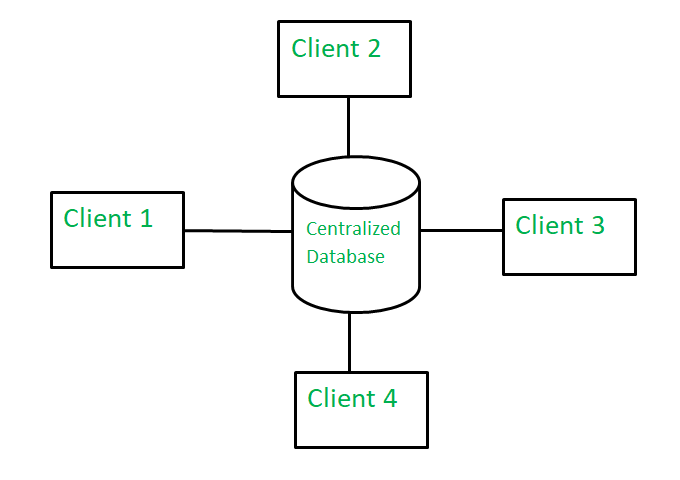1. 集中式数据库:
集中式数据库基本上是一种仅在单个位置存储、定位和维护的数据库。这种类型的数据库是从该位置本身修改和管理的。因此,该位置主要是任何数据库系统或中央计算机系统。通过互联网连接(LAN、WAN 等)访问集中位置。这个集中式数据库主要供机构或组织使用。

好处 –
- 由于所有数据仅存储在一个位置,因此更容易访问和协调数据。
- 集中式数据库的数据冗余非常少,因为所有数据都存储在一个地方。
- 与所有其他可用数据库相比,它更便宜。
缺点——
- 集中式数据库的数据流量更多。
- 如果中心化系统发生任何类型的系统故障,那么整个数据都将被破坏。
2. 分布式数据库:
分布式数据库基本上是一种数据库,它由多个相互连接并分布在不同物理位置的数据库组成。因此,可以独立于其他物理位置管理存储在不同物理位置的数据。因此,位于不同物理位置的数据库之间的通信是由计算机网络完成的。

好处 –
- 由于数据已经分布在不同的物理位置,因此可以轻松扩展该数据库。
- 分布式数据库可以很容易地从不同的网络访问。
- 与集中式数据库相比,该数据库更安全。
缺点——
- 该数据库非常昂贵,并且由于其复杂性而难以维护。
- 在这个数据库中,很难为用户提供统一的视图,因为它分布在不同的物理位置。
集中式数据库和分布式数据库的区别:
| S.NO. | Centralized database | Distributed database | |||
|---|---|---|---|---|---|
| 1. | It is database that is stored, located as well as maintained at a single location only. | It is a database which consists of multiple databases which are connected with each other and are spread across different physical locations. | |||
| 2. | The data access time in case of multiple users is more in a centralized database. | The data access time in case of multiple users is less in a distributed database. | |||
| 3. | The management, modification and backup of this database is easier as entire data is present at the same location. | The management, modification and backup of this database is very difficult as it is spread across different physical locations. | |||
| 4. | This database provides a uniform and complete view to the user. | Since it is spread across different locations thus it is difficult to provide a uniform view to the user. | |||
| 5. | This database has more data consistency in comparison to distributed database. | This database may have some data replications thus data consistency is less. | |||
| 6. | The users cannot access database in case database failure occurs. | In distributed database if one database fails users have access to other databases. | 7. | Centralized database is less costly. | This database is very expensive. |